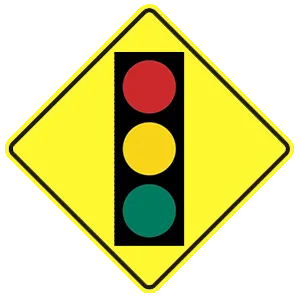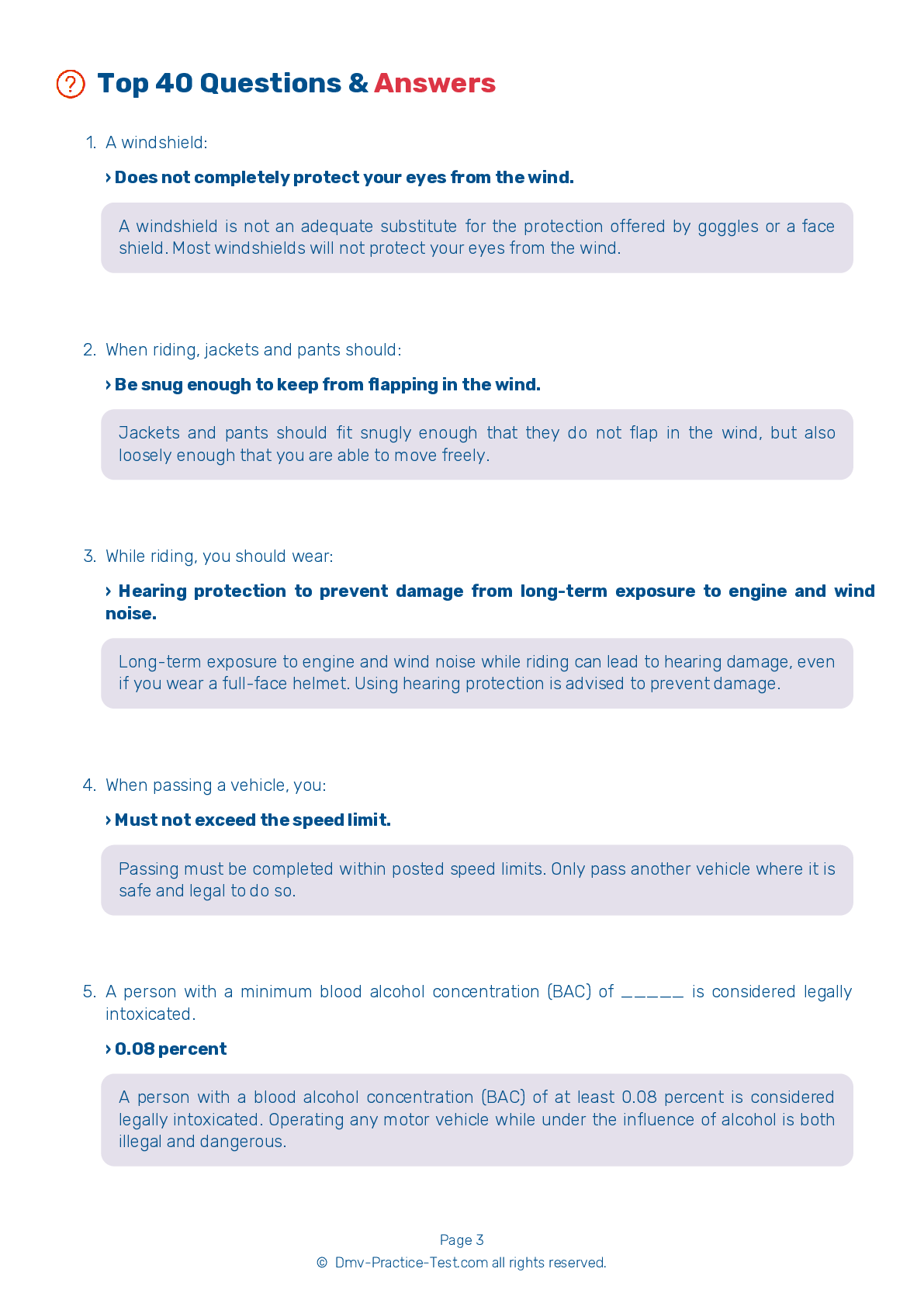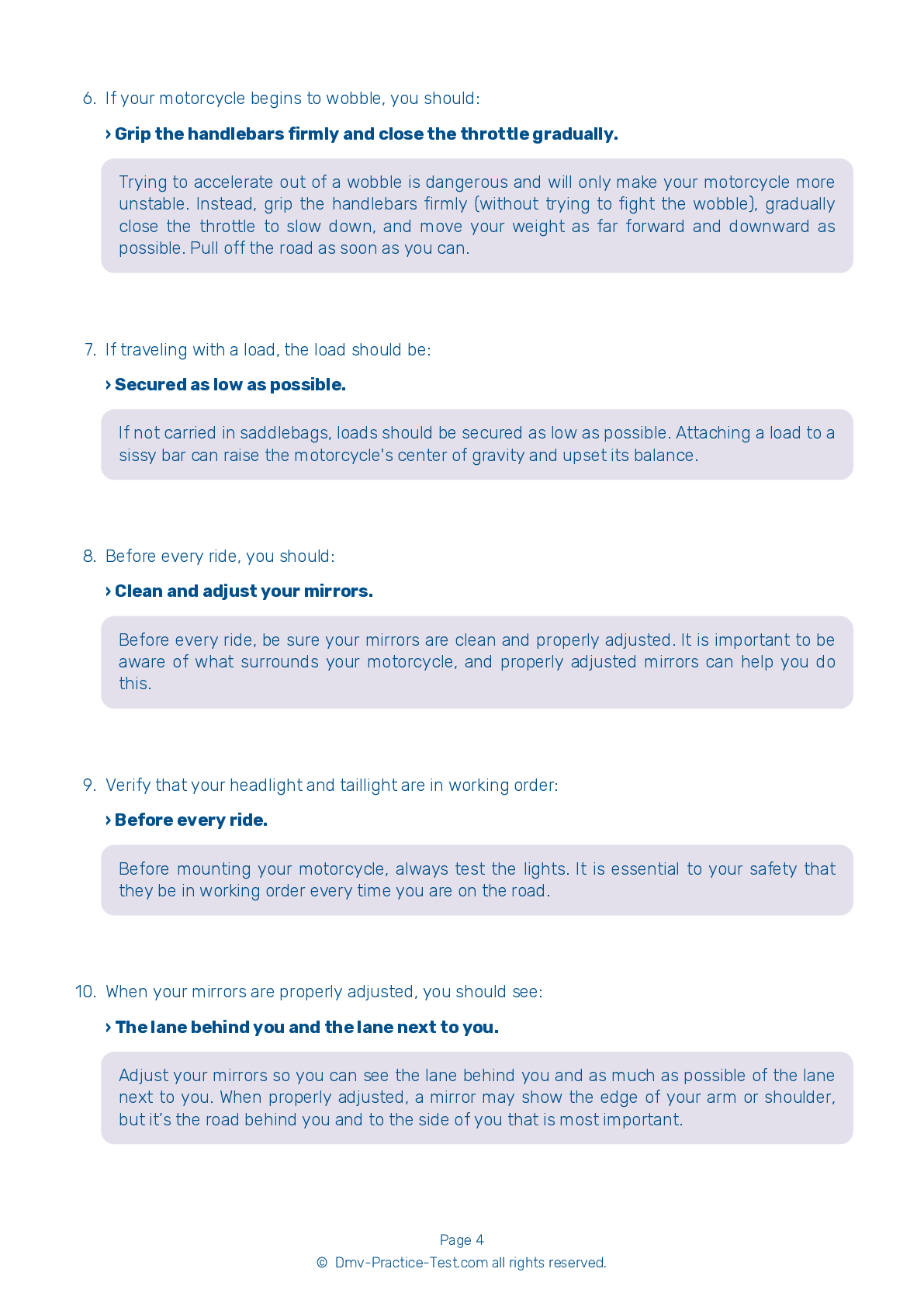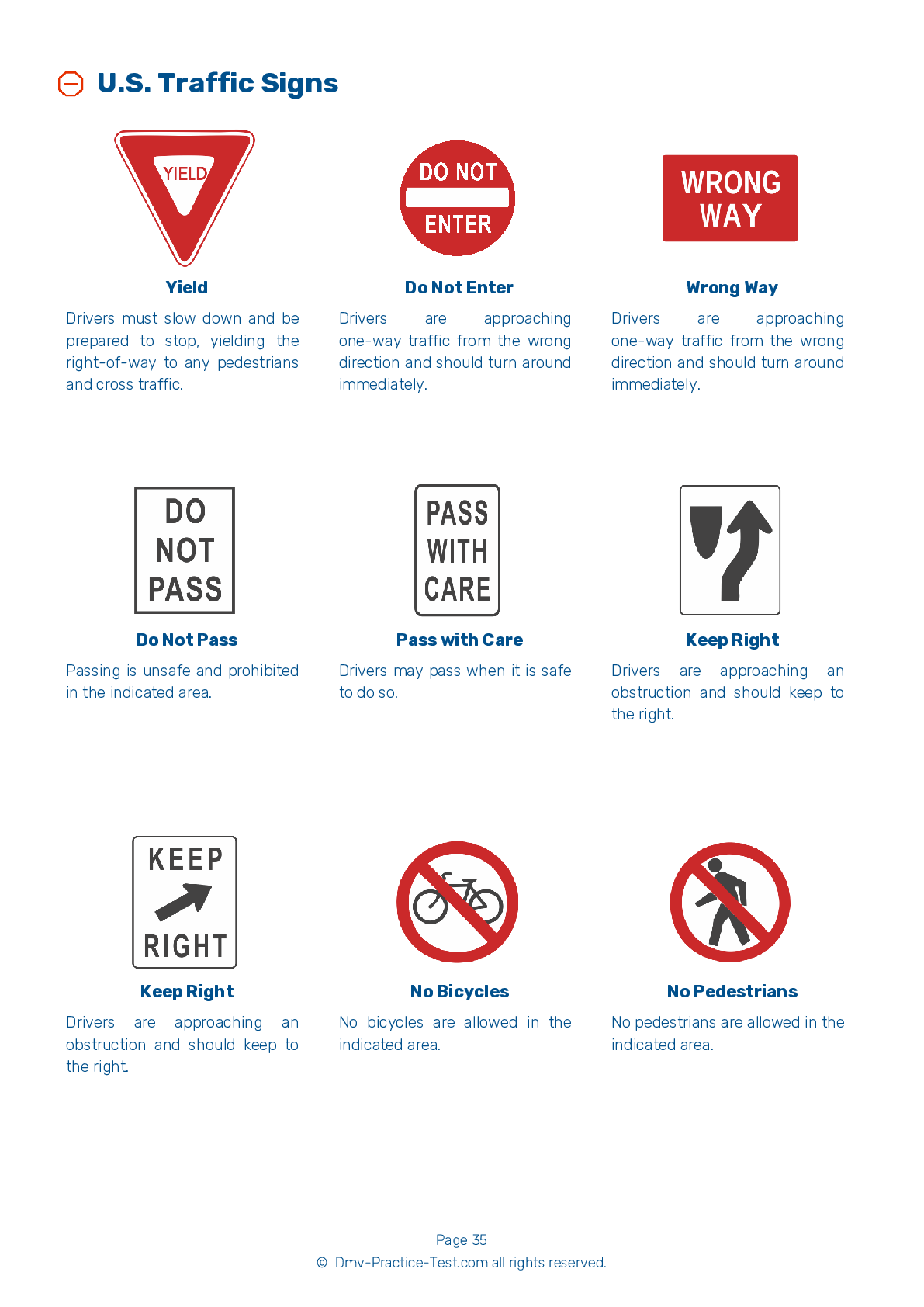DMV Permit Test #1
Motorcycle Test | License OH 2025 | FREE Online Practice! #1 Page 3 of 5
Take this FREE motorcycle test (license in OH 2025) to check your knowledge of the road rules. To improve your results, download a motorcycle handbook online, study theory, and practice for free on our website. Still worried about how to get a motorcycle license in Ohio in 2025? Check our website for more sample tests, train as much as possible, and boost your grades!
40
30
16
17 . When approaching an object or uneven surface that you cannot avoid, you should:
Rise slightly off the seat to allow your legs to absorb the shock.
If you cannot avoid riding over an obstacle or uneven surface, you should approach it at as close to a 90-degree angle as possible. Slow down as much as you can, make sure that your motorcycle is upright, and rise slightly off your seat so your knees can absorb some of the force of impact. Just before contact, roll on the throttle slightly to lighten the front end.
18 . What does this hand signal mean?

Backing up
Instead of or in addition to mechanical turn signals, operators may use hand signals to indicate turns or stops. If an operator's left arm is extended straight out to the left, it means the operator plans to turn left or change lanes to the left.
19 . Just like cars, motorcycles have blind spots. When switching lanes, you should:
Slow down so any vehicle in your blind spot can pass you.
Blind spots, by definition, are areas that you cannot see by just looking in your mirrors. Turn your head to the side and check over your shoulder for vehicles in your blind spot before you change lanes.
20 . When riding on a slippery surface, you should:
Travel on the shoulder so you are not next to other traffic.
To ride safely on a slippery surface, you should use both brakes when braking is necessary, reduce your speed, and avoid making sudden moves. Be especially alert to oily areas, shaded areas, dirt, gravel, and bridges, as these surfaces may provide less traction than others.
21 . Your motorcycle’s brake light is:
More easily seen than a car’s brake lights.
The brake light of a motorcycle is usually not as noticeable as the brake lights of a car. Flashing your brake light before slowing or stopping can help other drivers notice that you are about to brake.
22 . This sign means:
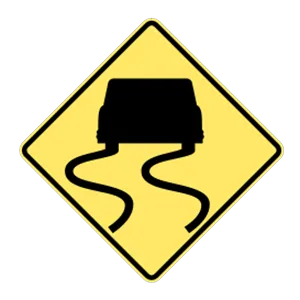
Apply your brakes quickly.
This sign warns that the road is slippery when wet.
24 . To provide the best protection, a helmet should:
Fit snugly.
To ensure you are getting the best protection, you should choose a helmet that meets U.S. Department of Transportation (DOT) and state standards. It should fit you snugly all the way around and have no obvious defects, such as cracks, loose padding, or frayed straps.
Need Motorcycle Insurance? No problem!
Compare the best rates in Ohio and find a personalized policy that meets your needs.
1. Are You Currently insured ?
2. Married ?
3. Do you own your Home?
4. Have you or a Family Member Honorably Served in U.S. Military ?
5. Your Name
6. Age
7. Zip code
Ranked by best match
2025 Ohio | Frequently Asked Questions
To acquire a motorcycle license in Ohio, you must first obtain a motorcycle learner's permit by passing a written test. After practicing with the permit, you can take a skills test to get your license. Alternatively, you can complete a Motorcycle Ohio Rider Education Course, which includes the skills test. You must be at least 15 and a half years old to start this process.
In Ohio, the minimum age to obtain a motorcycle license (endorsement) is 16. Applicants under 18 must have a valid probationary license, complete a basic rider course, and get a parent or guardian's approval. They must also pass the motorcycle knowledge test, vision screening, and on-cycle skills test to qualify for the license.
Yes, you do need a dedicated license to ride a motorcycle in Ohio. It's called a motorcycle endorsement, which gets added to your existing driver's license. To obtain this, you need to pass a knowledge test and an on-cycle skills test. Alternatively, completion of an approved Motorcycle Safety Foundation course can waive these tests.
In Ohio, to apply for a motorcycle driver's license you need a valid Ohio driver's license, proof of your Social Security number, proof of legal presence in the U.S., and proof of your name, date of birth, and Ohio residency. For minors, a parent or guardian must also provide written consent.
Yes, you will need to take a written exam to obtain a motorcycle license in Ohio. The test covers motorcycle operation and safety rules. However, if you complete an approved Motorcycle Safety Foundation course, the written and on-cycle skills tests can be waived. But remember, a vision screening test is still mandatory for all applicants.
The written test for a motorcycle license in Ohio covers a variety of topics related to motorcycle safety and operation. These include understanding traffic signs and signals, proper riding techniques, navigating intersections, handling emergencies, and Ohio's specific motorcycle laws. The test is designed to ensure that riders have the knowledge necessary to safely operate a motorcycle on the road.
In Ohio, completion of a Motorcycle Safety Foundation (MSF) course can waive the written and on-cycle skills tests required for a motorcycle endorsement. After successfully completing the course, you'll receive a completion card which you can present at a Driver Exam Station to have the tests waived. However, you still need to pass a vision screening test.
To enroll in a Motorcycle Ohio Rider Education Course, visit the Ohio Department of Public Safety's website. You must be at least 15 and a half years old. Choose a course and location that suits you, then register and pay the fee online. The course includes both classroom instruction and hands-on training. Completion of the course includes the skills test for licensing.
No, you don't need to own a motorcycle to take the license test in Ohio. You can use any motorcycle that is insured, registered, and meets all legal safety requirements. However, it's crucial that you have permission to use the motorcycle and feel comfortable operating it for the test.
Yes, you can use a friend's motorcycle for the driver's license test in Ohio, but the motorcycle must be street-legal, registered, and insured. Also, you must have written permission from the owner if the owner is not present at the test. Remember that you are responsible for providing a safe and appropriate vehicle for your test.
Yes, during Ohio's motorcycle driving exam, specific handling skills are tested. These include starting and stopping, turning and swerving, and proper use of the clutch and throttle. You'll also be evaluated on signaling, maintaining a safe distance from other vehicles, lane positioning, and defensive driving techniques. It's crucial to demonstrate control and safety throughout the test.
Yes, in Ohio, new motorcycle drivers with a Temporary Instruction Permit Identification Card (TIPIC) face several restrictions. They are not allowed to ride at night, on interstate or limited access highways, or carry passengers. They must also always wear a helmet and protective eyewear. These limitations are lifted once they obtain a full motorcycle license.
Yes, your Ohio motorcycle license will permit you to ride a motorcycle in other states. Motorcycle licenses, like regular driver's licenses, are recognized across all 50 states due to the Full Faith and Credit Clause of the U.S. Constitution. However, you must follow the specific motorcycle laws of each state you're in.
In Ohio, only certain riders are required to wear a helmet while operating a motorcycle. Helmets are mandatory for riders under the age of 18 and for those with a "novice" designation on their license. However, it is highly recommended that all motorcyclists and their passengers wear helmets for safety reasons, regardless of age or experience level.
Yes, in Ohio, there are two types of motorcycle licenses: TIPIC (Temporary Instruction Permit Identification Card) and a full motorcycle license. The TIPIC is valid for one year and allows you to practice riding. The full motorcycle license, obtained after passing a skills test, gives you complete legal authority to operate a motorcycle on public roads.
Yes, you can add supplementary endorsements to your motorcycle license in Ohio. These endorsements allow you to operate different types of motorcycles. To add an endorsement, you must pass a written and skills test for that specific type of motorcycle. Check with the Ohio Bureau of Motor Vehicles for more details on the process.
Yes, the motorcycle license test in Ohio is available in multiple languages to accommodate non-English speakers. However, it's advisable to check with your local BMV office for the list of languages they offer for the test. They can provide you with an interpreter or translated written tests based on availability.
An effective strategy to prepare for the motorcycle license test in Ohio is to study the Ohio Motorcycle Operator's Manual thoroughly. It contains all the information you'll be tested on. You can also take practice tests available online to familiarize yourself with the format of the exam and gauge your preparedness. Remember, practical riding practice is also essential for the skills test.
Yes, the Ohio Bureau of Motor Vehicles (BMV) offers the motorcycle written exam in several languages other than English. These include Spanish, French, Arabic, and many others. It's advisable to contact your local BMV office in advance to ensure the test is available in your preferred language.
If you do not pass the motorcycle written test in Ohio, you are allowed to retake it. However, you must wait at least 24 hours before attempting the test again. It's recommended to review the Ohio Motorcycle Operator's Manual thoroughly before retaking the test to increase your chances of passing.
